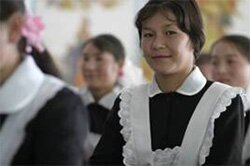
# 259
October 28, 2005
In this issue:
UNITED NATIONS DEVELOPMENT PROGRAMME (UNDP) €“ Organization for Security and Co-operation in Europe (OSCE)
- €œLearning the art of conflict transformation€
THE UNITED NATIONS POPULATION FUND (UNFPA)
- Gender Equality is Indispensable to Making Poverty History
UNITED NATIONS DEVELOPMENT PROGRAMME (UNDP) €“ Organization for Security and Co-operation in Europe (OSCE)
€œLearning the art of conflict transformation€
In Osh Tajik and Kyrgyz participants of a five day training course practiced how understanding, empathy and creativity can change a conflict situation
The seminar held past weekend brought together mid-level and senor officials from Sogd province and district administrations, Tajikistan and Batken province and district administrations, Kyrgyzstan, as well as community leaders and partners from the joint Cross-Border Project of UNDP Preventive Development Programme in Kyrgyzstan and Tadjikistan and SDC in Uzbekistan.
Mr. Taalaybek Ibraimov, head the Kyrgyz Aksay municipality close to the Tajik border underlined €œThis training was the best one I have ever attended. It offered everyone good opportunity to deepen knowledge and skills in such field as social security and conflict transformation €“ the vital issues in border adjacent communities especially in the light of the current social and political events in Kyrgyzstan and neighboring states€.
The seminar-training was the second of its kind and is a joint initiative of UNDP Preventive Development Programme and OSCE Academy in Bishkek in the sphere of conflict prevention and resolution. Last year a similar training was organized in Aksy district with involvement of direct participants of Aksy events.
During three days the leading trainers from Austria Wilfred Graf and Gudrun Cramer, with broad experience of conflict adjustment in different spots of the globe, in Caucasus and Sri Lanka in particular, have worked together with training participants according to six-step process, that is structured by three phases, six dimensions and movements, aiming at inspiring analytical empathy of a conflict party for the others and releasing sufficient creativity within a conflict party, so that it can develop possible solutions, that would take into consideration the symmetric fulfillment of human basic needs of all conflict parties.
The training was based on the Transcend Method of Johan Galtung and influenced by concepts, theories and approaches of Roland Barthes, Hermann Broch, Norbert Elias, Umberto Eco and others and on practical experience with conflict transformation in countries like Sri Lanka, Georgia, Armenia, Azerbaijan, Serbia and Montenegro, Kyrgyzstan, Kazakhstan, Uzbekistan€
The diverse participants of the training mainly local authorities and community leaders from two neighboring states had a unique opportunity to exchange ideas and experiences on cross-border challenges and ways out from their national contexts as well as acquire in-depth knowledge of international and regional conflict transformation practices. The major outcome of the training became completion of necessary background work for the formulation of actions plans (both individual for communities and joint cross-border) in writing and identifying challenges in implementing conflict prevention strategies and instruments.
The training prepared good ground for its participants in particular province and district level authorities from both states to discuss vital issues during unofficial meetings outside the training room and map out perspectives plans for further cooperation.
At the end of the training the participants were awarded with certificates on the basis of active participation and attendance as well as fulfillment of the requirements related to the plan of action exercise.
For additional information please contact Abdiraim Jorokulov, Programme Manager by phones 5-57-13 or 5-78-37. Likewise, information about our Programme is accessible on our official website at www.pdp.undp.kg
THE UNITED NATIONS POPULATION FUND (UNFPA)
Gender Equality is Indispensable to Making Poverty History
 New Report Calls for World Leaders to End Discrimination and Live Up to Promises Made to World€™s Women and Girls New Report Calls for World Leaders to End Discrimination and Live Up to Promises Made to World€™s Women and Girls
Global efforts to €œmake poverty history€ will fail unless world leaders act now to end gender discrimination, according to The State of World Population 2005 report, released on October 12 by UNFPA, the United Nations Population Fund.
The report, The Promise of Equality: Gender Equity, Reproductive Health and the Millennium Development Goals, calls upon world leaders to fulfill promises made to the world€™s women and young people in order to meet poverty reduction goals agreed to at the 2000 Millennium Summit and reaffirmed by last month€™s World Summit in New York. Investing in women and young people€”who constitute the majority of the world€™s population€”will accelerate long-term development. Failure to do so may entrench poverty for generations to come.
I am here today to say that world leaders will not make poverty history until they make gender discrimination history€, said UNFPA Executive Director Thoraya Ahmed Obaid during the launch of the report on October 12 in London. €œWe cannot make poverty history until we stop violence against women and girls. We cannot make poverty history until women enjoy their full social, cultural, economic and political rights.€
The report stressed that discrimination leads to lower productivity and higher health costs. It also results in higher death rates among mothers and children and significantly threatens efforts to reduce poverty around the world.
Worldwide, reproductive health problems€”including HIV/AIDS€”constitute the leading cause of death and illness among women between the ages of 15 and 44. Every minute, a woman dies needlessly of pregnancy-related causes.
In Kyrgyzstan also, maternal mortality remains a major concern, as the country has the highest maternal mortality in the whole of Central Asia, reaching almost 50 per 100€™000.
 Lack of access and use of modern contraceptives is one of the factors behind this high number. Only 27 percent of women use contraceptive means in the country. The lack of skilled attendants for birth delivery is another factor, especially in remote areas. The report stated that providing access to family planning could cut maternal death by 20 to 35 percent. Lack of access and use of modern contraceptives is one of the factors behind this high number. Only 27 percent of women use contraceptive means in the country. The lack of skilled attendants for birth delivery is another factor, especially in remote areas. The report stated that providing access to family planning could cut maternal death by 20 to 35 percent.
Violence€”perhaps the most systematic and pervasive of human rights abuses€”continues to terrorize millions of women and girls regardless of geography, race or socio-economic status, says the report. Worldwide, 1 in 3 women is likely to experience physical, sexual or other abuses during her lifetime€”usually by a family member or acquaintance.
In Kyrgyzstan, up to three thousand women apply every year to a crisis center for gender violence related issues. In addition, occurrences of coercion to marriage through €œbride kidnapping€ are still reported, despite criminal liability.
Globally, women hold only 16 per cent of parliamentary seats€”an increase of only 4 per cent since 1990. Some of the greatest strides are being made in developing countries. Rwanda, for example, has now surpassed Sweden with the highest proportion of women holding parliamentary seats in the world. In Kyrgyzstan, no progress has been registered in this area. Not a single woman is member of the new Jogorshu Kenesh and too few women hold a high-level official position.
Investing in political, economic and educational opportunities for women and girls will yield greater results that lead to improved economic prospects, prosperous and healthier families, lower HIV/AIDS prevalence rates, reduced family violence and harmful traditional practices.
€œI can assure you that women all over the world are tired of promises, promises, promises,€ Ms. Obaid said. €œThe time has come; we have the means, we have the commitment. Now we need action.€
Additional information and copies of the report can be obtained by contacting: Julien Pellaux or Nataliya Kim, ph: (312) 61 12 02; E-mail:
|

